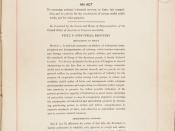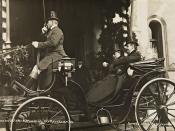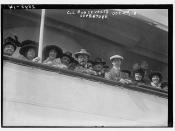In 1932, America was three years into the Great Depression. The presidential election that year presented a choice between Republican Herbert Hoover and Democrat Franklin D. Roosevelt. Hoover's actions as president did little to affect the depression or instill hope in the public. Roosevelt won the election after promising a "New Deal" for America. His administration enacted a series of legislation to combat the depression and aid those in need. This legislation included increased government spending programs, pro-labor laws, regulation reforms, and the beginning of the modern welfare state. The New Deal remained mainly intact through the 40s and 50s, but experienced a rebirth in the 60s. President Lyndon Johnson's "Great Society" expanded the New Deal and made new initiatives into Civil Rights, where Roosevelt did not. However, the Great Society was short-lived, and soon Ronald Reagan was president in the 80's. Through a combination of conservative social and fiscal policies, the Reagan administration weakened and challenged initiatives of the New Deal.
The New Deal of the 1930s has since been augmented in the 1960s, but more recently diminished, if not largely undermined, in the 1980s by a political-economic vision of a quite different sort.
Herbert Hoover was an architect of the economic growth in the 20s, serving as Secretary of Commerce to Harding and Coolidge. These Republican administrations pursued tax cuts, a reduction in government spending, and a lax policy on business regulation. These tax cuts fueled inflationary pressures and contributed to the high risk speculation of the stock market (TS 937). The country lurched into depression, and the Hoover administration was divided on approaches to the situation. At the behest of his party, Hoover supported the Smoot-Hawley Tariff bill (LN 10/21). This bill increased tariffs in 1930, which stunted trade and hurt US farmers. Hoover was torn between...


